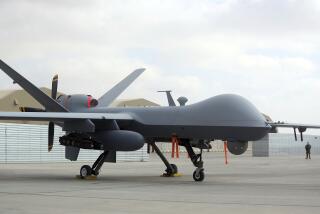Russia Issues Warning After U.S. Laser Test
- Share via
WASHINGTON — The Kremlin on Tuesday declared that the U.S. Army’s use of a ground-based laser to strike a satellite threatens arms stability, warning that it would take the American experiment into account in considering its own weapon needs.
Briefing reporters in Moscow, Foreign Ministry spokesman Gennadi Tarasov said the test “could become a step toward the creation of an anti-satellite potential” and is being watched with concern by Russian leaders.
The test, carried out at the Army’s White Sands Missile Range in New Mexico on Friday, was described by the Pentagon as part of an effort to determine the vulnerability of U.S. satellites to ground-based lasers. U.S. officials have insisted that the experiment was not part of an effort to develop anti-satellite weaponry.
But arms control advocates had warned that the test might convince other nations that the Pentagon wants anti-satellite weapons and could set off a new arms race.
Tarasov said Russia fears Washington is developing a weapon that might violate the 1972 U.S.-Soviet Anti-Ballistic Missile Treaty, which limits countries from deploying defenses against long-range strategic missiles.
Noting that the so-called Miracl laser was developed as an anti-missile weapon, “the question arises of how compatible such work is with progress achieved on joint measures to ensure compliance with the ABM treaty,” Tarasov said.
He added: “The creation of anti-satellite weapons could sharply change the strategic situation.”
Kenneth Bacon, chief Pentagon spokesman, said the purpose of the test “had nothing to do with attempting to shoot down satellites and absolutely nothing to do with ballistic missile defenses.”
He said U.S. officials had sought to make it clear to top Russian officials in public statements and private talks that the test’s object was “to evaluate the vulnerability of U.S. satellites to lasers.”
In last week’s test, the laser beam generated some heat when it struck the satellite, but the craft was not seriously damaged. Army scientists are hoping to use test data to assess how much destructive power can be trained on a satellite from a ground-based laser.
Military analysts said that anti-satellite weapons could prove useful in a war, given the ability of satellites to pinpoint arms and troops.
Aside from the United States, a number of other Western industrial nations, as well as China and Russia, have the capability of developing large lasers.
Only last week, the United States sought to send another message about its intentions on the anti-satellite issue when President Clinton, using his line-item veto power, eliminated a $37-million program to develop a kinetic energy anti-satellite weapon.
More to Read
Sign up for Essential California
The most important California stories and recommendations in your inbox every morning.
You may occasionally receive promotional content from the Los Angeles Times.














